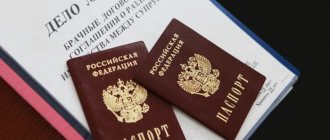Author of the article: Yulia Kaysina Last modified: January 2020 2833
Several tens of thousands of orphans live in orphanages in the Russian Federation. The problem of transferring them to be raised in full-fledged families is very acute, especially considering that half of them have significant health problems. In such a situation, the adoption of Russian children by foreign citizens becomes a happy ticket to a fulfilling life for hundreds of orphans.
Peculiarities
In Art. 124 of the RF IC states that Russian children left without parental care can be adopted by foreign citizens or stateless persons only if there are no applicants for adoptive parents with Russian passports.
What other features are there:
- It is possible to adopt a child into a family only if information about him/her has been submitted to the federal orphan database for at least 12 months from the date of the potential adoptive parent’s application. An exception is close relatives of a minor: they do not have to wait one year;
- If a child has brothers or sisters, their separation is not allowed. Children can be separated only if it does not conflict with their interests.
- When considering a case, the court must be guided by the interests of the minor in the first place. His origin, knowledge of the language, and relationship with the future adoptive parent are taken into account;
- Adoption is carried out taking into account the norms of an international treaty, Russian legislation and the laws of the country whose citizenship the adoptive parent has;
- If the foreign adoptive parent is married to a citizen of the Russian Federation, the child is transferred according to Russian law;
- If the rights of the minor are violated as a result, the court will refuse to satisfy the application;
- As a result of adoption, people receive all the rights and responsibilities of parents.
Important! Taking children into families by foreign citizens permanently residing in the Russian Federation is a little easier than for those who live abroad. The difference lies in the peculiarities of document preparation: in each case an individual procedure is provided.
Under what conditions will the procedure take place?
The main thing is that foreigners are allowed to adopt only those children who were not taken into care by Russian families or the families of relatives living abroad. This fact is supposed to be officially confirmed by the guardianship and trusteeship authorities.
Information about minor children who are subject to placement in families is stored in a unified state data bank. Applicants for adoptive parents are allowed to meet her. 12 months after a new name appears on the list, the child’s profile is offered exclusively to citizens of the Russian Federation; after a year it becomes available to foreigners.
It is prohibited to transfer children to non-citizens of the Russian Federation if they:
- US nationals;
- are in a same-sex marriage;
- have citizenship of a state in which same-sex marriage is officially legalized.
Our country does not prohibit the work of intermediary organizations in the adoption of children, but they are not allowed to work with Americans on this issue.
The ill health of a child will not become an obstacle to adoption by foreigners. They are much more likely than Russians to take sick children into their families. International adoption is available only to wealthy people, therefore, they can also afford expensive treatment for a child.
The transfer of children to adoptive parents from abroad occurs solely in the interests of orphans, therefore, ethnic, religious, cultural origin, compatibility in these indicators with a potential adoptive parent, and the possibility of full existence and development in another state are taken into account.
As for Russians, adoption of siblings is not allowed for different people, with rare exceptions.
If, after the adoption, facts of violation of the child’s rights under the laws of any country become known, the adoption will be cancelled.
Who decides the fate of children
Persons wishing to become adoptive parents do not have the right to apply for information directly to orphanages and other institutions for children left without adult care; exclusively to government bodies that are representatives of the federal data bank. Candidates are free to choose the region of the country at their own discretion. It is also unimportant whether foreigners contact the regional operator personally or through a representative office of an NPO with accreditation for intermediary services in placing Russian children in the families of foreign citizens.
A referral to the appropriate child care institution to meet a potential adoptable child is issued personally to the applicant. He studies his personal file, be sure to familiarize himself with medical diagnoses, and establishes psychological contact with the child. He himself comes to the institution for him if the issue is resolved positively.
Examples of what to do if:
The husband is a foreigner, the wife is from the Russian Federation, they want to adopt a child from the Russian Federation. If one of the spouses has Russian citizenship, but is married to a citizen of another country, the process of registering parental rights for children is carried out in accordance with Russian legislation.
A husband and wife are from the Russian Federation, but live outside the Russian Federation and want to adopt a child from the Russian Federation. According to Art. 165 of the RF IC, citizens permanently residing abroad must undergo the procedure according to the rules of the international standard, that is, those that apply to foreigners.
When adoption is not possible
A foreign citizen will not be able to take a child into his family if he:
- Does not meet the requirements for adoptive parents;
- Has US citizenship. The adoption of Russian children by US citizens, regardless of the situation, is prohibited;
- Is in a same-sex marriage;
- Not married, but same-sex relationships are legalized in his state;
- Limited in legal capacity, recognized as completely incompetent;
- Has a conviction for a particularly serious or serious crime;
- Has medical contraindications for health: suffers from tuberculosis, oncology, mental disorder, drug addiction, alcoholism, infectious diseases (until complete recovery);
- Does not have a permanent source of income or place of residence;
- Didn't complete the adoption courses.
Note! If a foreigner is a child’s stepfather or stepmother, or a close relative, the requirements for the availability and amount of income or living space do not apply. Courts are more willing to release children to their loved ones.
Requirements for adoptive parents of foreign countries
Let's figure out who is considered a foreign citizen:
- people born and permanently residing in the territory of a foreign state;
- Russians living in another country for more than 6 months;
- people without citizenship;
- people who have several citizenships, one of which is Russian, but do not live in Russia.
Only an adult man or woman - a married couple or a single person - can become an adoptive parent. A couple who is not officially married will not be able to adopt one child.
Let us remind you that the adoption by foreign citizens of children who are citizens of the Russian Federation occurs on the basis of the legislation of the Russian Federation. Therefore, the requirements for foreigners are the same as for Russian citizens. But keep in mind that the relevant authorities especially carefully check adoptive families with foreign citizenship.
Now more about the requirements. The following persons cannot become adoptive parents:
- who have been recognized by a court as having limited legal capacity or incapacity;
- married couples in which one of the spouses has been recognized by a court as having limited legal capacity or incompetence;
- whose parental rights have been limited or deprived in court;
- who were removed by court from guardianship duties for their improper performance;
- who were already adoptive parents, if the adoption was canceled by the court due to their fault;
- who are unable to provide a child with a living wage;
- who do not have a permanent place of residence;
- who have had or have a criminal record for crimes against life, health, honor and freedom of a person;
- who have had or have a criminal record for serious and especially serious crimes;
- who have not undergone special training for foster parents;
- whose health condition does not allow them to become a foster parent.
Diseases that relate to the last point:
- tuberculosis of groups I and II of dispensary observation;
- infectious diseases that are not in complete remission;
- malignant tumors of any area in stages III and IV and malignant tumors of stages I and II, until appropriate treatment has been carried out;
- mental and behavioral disorders;
- any type of drug addiction – drug addiction, substance abuse, alcoholism;
- injuries and diseases related to disability group I.
Note : Foreign citizens can undergo training for foster parents on the territory of their country by providing a document about this drawn up in accordance with all the requirements of Russian legislation.
Requirements for special training do not apply to:
- stepfather or stepmother;
- close relatives;
- guardians and adoptive parents for whom their status has not been revoked.
Who has the right to be an adoptive parent?
To take a child into a family, you must meet the established requirements (Article 127 of the RF IC):
- Age of majority, full legal capacity;
- The age difference with the child is at least 16 years, if the adoptive parent is not married. This requirement does not apply to relatives of children. In other cases, for good reasons, the court has the right to reduce the age difference;
- Consent of the adoptive parent's spouse and other family members over 10 years old;
- No criminal record;
- Having a regular income. It will be calculated taking into account the costs for each family member;
- Availability of a conclusion on the possibility of becoming an adoptive parent, issued by a foreign authority, if the citizen does not live in Russia;
- Availability of a conclusion from the AOiP on the territory of a constituent entity of the Russian Federation, if the future adoptive parent lives there;
- Submission of certified copies of translations of all documents.
- Having a permanent place of residence. This will have to be confirmed by documents of ownership or a rental agreement for residential premises.
- Completing special training courses.
Note: a foreign country may have additional requirements for adoptive parents living on their territory if the child is transported there.
Who can represent the interests of adoptive parents
Mediation activities for the transfer of children into guardianship or adoption in the Russian Federation are prohibited. But bodies specially authorized by foreign states can represent the interests of adoptive parents through representative offices registered in the prescribed manner on the territory of the Russian Federation.
What the representative offices are authorized to do:
- Submit documents to the federal data operator to select a child from the database;
- Send documents to the court;
- Provide consulting support;
- Issue invitations and visas;
- Participate in court proceedings when considering cases, receive copies of court decisions;
- Assist adoptive parents in re-registration of documents for children.
However, adoptive parents will have to personally attend court hearings, meet with the child, study his documents and sign an act confirming familiarization with the minor’s medical documents.
Order of conduct
To adopt a child from Russia, a foreign citizen must come to the country and contact any of the agencies that provide such services. There he will be able to obtain contacts of a representative of the guardianship authorities, from whom it is possible to obtain information about children for whom international adoption is permitted.
Required documents:
- Biography of the adoptive parent, in which you must indicate your marital status and the presence or absence of children in your care.
Documents characterizing the financial situation. They can be used as account statements, documents from work, etc.- A medical report on the health status of the candidate adoptive parent.
- Permission to adopt a child who is a citizen of another country.
- Copies of marriage certificate, passport.
- A document that confirms that the prospective adoptive parent has completed a training course.
- Conclusion on the living conditions of the adoptive parent from the competent authorities in his country.
All submitted documents must be verified by a special institution located in the country where the adoptive parent lives. After this, the documents must be translated into Russian, and the translation must be certified by a notary.
It is imperative that the relevant authorities from the country of which the adoptive parents are citizens confirm in writing their obligations to check and control everything related to the child’s living in the new conditions.
They must check and provide reports on how the child is adapting to his new life.
It is important that the child’s documents contain confirmation that the guardianship authorities several times offered his adoption to Russian families, but received refusals in response. Only in this case will the ban be lifted and adoption will be possible.
After submitting documents and receiving permission to adopt, the candidate can familiarize himself in more detail with information about the children in the database. During this, he chooses a child he wants to meet. The adoptive parent is given permission to visit the baby for some time, after which he must communicate his decision whether he will adopt this particular child.
If the decision is positive, you should submit the above documents to the court and add a statement to them. It must be written by both spouses, or one writes a statement, the other gives written consent to accept the baby into the family. You must provide your own information and information about the child. The main part of the application involves a request for adoption. It should also be noted that the prospective adoptive parent knows about the child’s health condition and other characteristics.
Court hearings in such cases are held behind closed doors. Representatives of the adoptee (if he is under 14 years old) or the adoptee himself (if he is over 14 years old), a prosecutor and a representative of the organization that is involved in the adoption process must be present there.
If there are no reasons to prohibit adoption, the court makes a positive decision. The adoptive parent is provided with the necessary documents, and a copy of the court decision must be sent to the registry office, where the procedure performed is registered.
The adopted child’s citizenship remains Russian, but it is possible to obtain citizenship of the country in which the adoptive parents live.
During the first 3 years, control must be exercised over how the adopted child adapts to new conditions.
This is done by special bodies, whose representatives are required to inspect the child’s living conditions at least 4 times.
How can a foreign citizen adopt a child?
If the future adoptive parent permanently resides in Russia , he only needs to contact the regional OOiP. If you permanently reside outside the Russian Federation, the procedure is different, and you will have to involve a foreign authorized body.
Note: the conclusion can be obtained both in the Russian Federation and in the state of which the applicant is a citizen. Interaction between all bodies is carried out taking into account the provisions of the international treaty concluded between the Russian Federation and another country. They send most of the documents to each other independently.
Step 1: obtaining a conclusion
The conclusion can be issued in your own country. To do this, you need to submit an application to the authorized body of the foreign state at your place of residence.
What the process looks like:
- The citizen submits an application for the issuance of an opinion. He is given a referral to undergo a medical examination and study at an adoption school.
- Passes a medical examination. This is necessary to confirm the absence of diseases for which transfer to a minor is not allowed.
- Training at school for foster parents. In Russia, courses are usually held in educational institutions, but in another country it may be different. Based on the results, an exam is taken. Psychological testing is required during the process. The guardian will need a certificate of completion of the course.
- Checking living conditions. It is carried out by a foreign body. Employees are studying the situation and talking with family members. As a result, an act is drawn up, and one copy is given to the future adoptive parent.
At the end, a conclusion is issued , which will be needed in the future for registration as an adoptive parent. They will also issue an undertaking , according to which the foreign authority will subsequently have to check the child’s living conditions.
Documentation
To obtain a conclusion, you need to submit a number of documents:
- Statement of the established form. Each country has its own.
- Autobiography.
- Marriage certificate (if available).
- Medical report on health status.
- Certificate of completion of courses.
- Certificate of ownership of real estate, or a rental agreement (if the housing is not your own).
- Certificate of income.
- Consent of the spouse if the minor is adopted by only one of the couple.
Important! The list of documents may change or be supplemented depending on the laws of another state.
Expenses
Adoption in all countries is free, including expenses. But in the future, the adoptive parent will have to incur costs for notarization of copies of translated documents, as well as to obtain a visa for the child.
Step 2: legalization of documents
Legalization means the execution of translation of all documents from a foreign language. Copies are made, which are subsequently certified by a notary.
Step 3: registration
To register as an adoptive parent, you need to submit all documents to the federal operator authorized to deal with cases of adoption by foreign citizens.
The operator must provide:
- Statement of desire to adopt a minor.
- Completed application form.
- Written obligations to provide the opportunity to examine the child’s living conditions after his departure from the Russian Federation, as well as to register him with the consulate.
- Obligation of the foreign authority to timely verify the living conditions of the adopted person.
- A document confirming the absence of legalization of same-sex marriage in the country of residence of the adoptive parent.
- Certificate of successful training in adoption courses.
You will also need a document confirming the right of a foreign organization to train future adoptive parents. After submitting the entire list, the applicant will be registered within 15-20 days.
Step 4: Meet your child
To meet with a minor, you need to receive a referral from the POiP at his place of residence. Everything happens in the presence of a guardianship officer. Based on the results, a report is drawn up; it will be needed in court.
Step 5: Submitting documents to the court
An application for adoption and all the documents needed for registration must be submitted to the regional court. Closed meetings are held. The decision is made by a single judge and comes into force after 10 days. But you can apply for immediate execution.
When the decision comes into force, you must submit a certified copy of it to the organization at the child’s location and pick it up.
Adoptive happiness
“The purpose of the new document, which comes into force on January 1, 2021, is to replace the current Resolution of the Government of the Russian Federation dated November 4, 2006 No. 654 on a similar topic,” Anna Kuznetsova, Commissioner for Children’s Rights under the President of the Russian Federation, explained to RG.
In particular, in the document, the Russian Ministry of Foreign Affairs is excluded from among the federal executive authorities whose conclusion is necessary to make a decision on issuing a permit to open a representative office or a permit to carry out activities, or to refuse to issue the corresponding permit, clarifies Anna Kuznetsova. And also from 1 year to 3 years the period during which a letter of recommendation from the competent authority of the state that issued a license (or other document) or exercises control over the activities of a foreign non-profit organization on the possibility of carrying out adoption activities has been valid.
In addition, Anna Kuznetsova clarifies, certain provisions have been specified, for example, regarding the information provided about the management of a representative office of a foreign non-profit organization, the grounds for refusing to issue permits to open a representative office in the Russian Federation and the termination of the relevant permits. Also excluded is the provision on issuing a duplicate permit in case of its deterioration (a duplicate will be issued only in case of loss) and a number of other changes.
Despite the fact that most of the changes introduced are rather of a clarifying nature, the implementation of some of them (for example, the exclusion of the Russian Ministry of Foreign Affairs from the number of federal executive bodies, the conclusion of which is necessary for making certain decisions) will still need to be assessed from the point of view of how it is in will further influence practice.
“I would also note that over the past 5 years there has been a downward trend in the number of Russian children adopted by foreign citizens,” Anna Kuznetsova told RG. — So, if in 2020 the share of such children from the total number of adopted children was 11.3, then in 2020 it was already 6.9. If we take numerical indicators, these are 746 children (of which 77 are disabled children) and 240 (25 disabled children), respectively.
It is important to continue to put into practice the task of prioritizing adoption by Russian citizens, Anna Kuznetsova is sure.
It is important to continue to put into practice the priority of adoption of orphans by Russian citizens, Anna Kuznetsova is sure
“This is not the first resolution on this topic, but rather a clarification of some aspects,” Armen Popov, head of the Usynovite.ru project, agrees with Kuznetsova. — The latest clarification of the situation was published in 2013. Over the past seven years, more changes have occurred, which this document takes into account. It streamlines and introduces some technical changes: for example, the validity period of a letter of recommendation from a foreign state regarding agency accreditation has changed. Although the resolution excludes the Ministry of Foreign Affairs from the list of organizations that approve permission to open an agency representative office in Russia, Russian consulates are entrusted with the mission of registering adopted children, notes Armen Popov. He also draws attention to an obvious trend: in recent years in Russia the number of international adoptions has decreased many times. “Recently, the government has been doing a lot to ensure that Russian citizens take our children. If in the 90s foreign adoption was actually the only form of placing a child in a family, now this form of family placement has become rather rare. Russian citizens now have a priority right, and they are very actively using it. The number of orphans has decreased significantly. When 15 years ago we opened our portal “Usynovite.ru”, there were about 180 thousand orphans in the data bank, and now there are 43 thousand.”







